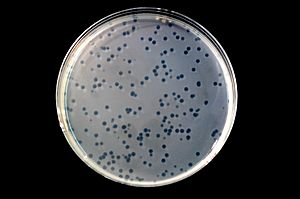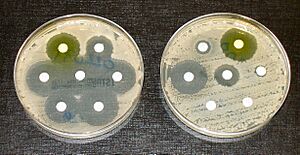Antibiotics facts for kids

An antibiotic is a special kind of medicine. It is a chemical compound that either kills bacteria or stops them from growing. Doctors use antibiotics to treat and cure illnesses caused by bacteria.
The very first antibiotic discovered was Penicillin. It was a natural antibiotic made by a type of fungus. Antibiotics started being produced in 1939. Today, many antibiotics are made using chemical synthesis in labs. It's important to remember that antibiotics only work against bacteria. They cannot be used to treat viruses, like the common cold or flu.
Contents
Why Bacteria Become Stronger
People are worried that antibiotics might stop working. This is because bacteria can change over time. Many types of bacteria are already becoming resistant to common antibiotics.
When bacteria are exposed to antibiotics, most of them die. But some bacteria might have small changes, called mutations. These changes make them a little bit stronger against the antibiotic. These stronger bacteria then survive and multiply. Soon, there is a large group of bacteria that are not affected by the antibiotic as much. This is called Antibiotic resistance.
How We Make It Worse
Sometimes, people use antibiotics when they don't need them. For example, if someone has a virus, antibiotics won't help. But some doctors might still give antibiotics. This makes patients feel like they are getting treatment. However, it can also lead to bacteria becoming resistant.
Another problem is when people don't use antibiotics correctly. They might stop taking the medicine as soon as they feel better. But antibiotics don't kill all the bad bacteria right away. The stronger bacteria take longer to die. If you stop taking the antibiotic too soon, these tough bacteria can survive and grow. Then, the antibiotic might not work well the next time you need it.
The Story of Antibiotics
Antibiotics are one of the best ways to fight bacterial infections. A long time ago, a scientist named Louis Pasteur noticed something interesting. He had some anthrax germs that were left in the air. Fungi started to grow, and the anthrax germs disappeared. But at that time, no one understood what this meant for medicine.
The real study of antibiotics began in 1928. A bacteriologist named Alexander Fleming was working in London. He was growing bacteria called staphylococcus in a Petri dish. One day, a mould appeared in the dish. Around each patch of mould, there was a clear ring where no bacteria grew. Fleming found that a substance from this mould could clear up infected wounds. This substance was Penicillin.
The word antibiotic was first used in 1942. It was used by Selman Waksman and his team. They used it to describe any substance made by a tiny living thing (a microorganism) that stops other microorganisms from growing. Today, many antibacterials are changed versions of natural compounds.
How Antibiotics Are Used
Different types of bacteria are affected by different antibiotics. A doctor needs to figure out which bacteria is causing an infection. Then, they can choose the right antibiotic and the correct amount.
Because of this, you should always use antibiotics under a doctor's care. The doctor can also check for any side effects. They can change your treatment if needed. Antibiotics are very helpful when your body has a bacterial infection.
Remember, antibiotics do not kill viruses. So, they are useless against a viral infection. A doctor must decide if your infection is caused by a virus or bacteria. This is another reason why a medical doctor should prescribe antibiotics. You should not try to treat yourself with them.
New Discoveries
Scientists are always looking for new antibiotics. Teixobactin is a new antibiotic that was discovered recently. It works against certain types of bacteria, including Staphylococcus aureus. It seems to be part of a new group of antibiotics.
Related pages
- Antibiotic resistance
- Antiviral drug
Images for kids
-
Paul Ehrlich and Sahachiro Hata
See also
 In Spanish: Antibiótico para niños
In Spanish: Antibiótico para niños









